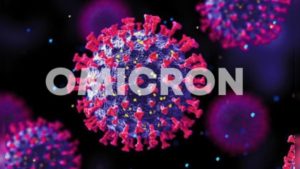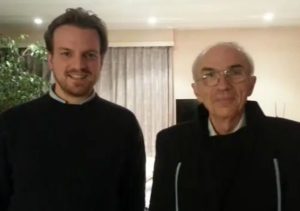
Amidst rising COVID-19 cases — mostly the less virulent, but 3 to 5 times more transmissible Omicron variant — with reimposed restrictions by public health authorities, more stringent mask mandates, a speeded up mRNA booster programme (at least in some Canadian jurisdictions, if not in British Columbia), more testing, renewed travel advisories, the closure of bars and gyms, and the likely prospect of increased infections and restrictions in the days to come and over the next couple of weeks, Christmas 2021 is quite not what most people had hoped it might be.
A couple of weeks back, on the day federal Finance Minister Chrystia Freeland presented her budget update, Politico Canada’s Nick Taylor-Vaisey reported that while interviewing senior government officials in lock up, the Deputy Ministers of Health and Finance, as well as representatives from the Prime Minister’s office, told the gathered journalists that the federal government doesn’t foresee Canada “getting a handle on” COVID-19 until the summer of 2023, at the earliest.
Although the likelihood is great that late spring and early summer 2022 will see a reduction in the number of COVID-19 infections — as was the case in the summers of 2020 and 2021 — next autumn and winter, including the holiday season in 2022, will in all likelihood mirror what we’ve all experienced over the course of the past almost 22 months. Sad and disappointing news, but our new collective reality.
British Columbia’s Public Health Officer, Dr. Bonnie Henry, told British Columbians last Tuesday that all British Columbians will likely become infected with the Omicron variant, clarifying her statement this past Friday, saying that, “All British Columbians will come into contact with Omicron in January.”
 Jens von Bergmann, data scientist with British Columbia’s COVID-19 Modelling Group
Jens von Bergmann, data scientist with British Columbia’s COVID-19 Modelling Group
For the moment, Dr. Henry is choosing to ignore the advice of the B.C. COVID-19 Modelling Group. In an article published in the Vancouver Sun last week, the member scientists in the modelling group told reporter Lisa Cordasco that …
“An Omicron tidal wave is coming, hospitals will be overwhelmed — although 20 to 40 per cent fewer people will end up in hospital, as Omicron cases skyrocket our health care system will be challenged,” said Jens von Bergmann, a data scientist and a member of the modelling group, who went on to say that “although most people who are vaccinated will suffer only mild symptoms from the Omicron variant, the sheer number of people becoming infected across British Columbia will mean that many of our fellow citizens will suffer severe illness and death.”
“It is not clear to me that we have done enough and I think there is a very good chance that it is not (enough),” said von Bergmann. “If we have large indoor gatherings, these are opportunities for super spreader events. That certainly includes large sporting events like Canucks games, or going to restaurants to dine.”
The member scientists in British Columbia’s COVID-19 modelling group said they believe the only way to prevent super spreader events is, at a minimum, by shutting down all restaurants and indoor public events for three weeks.
On Tuesday December 21st, Dr. Henry ordered all bars, nightclubs, gyms, fitness centres, yoga and dance studios to close, and limited sports venues to 50% capacity until Tuesday, January 18th.
The members of B.C.’s COVID-19 modelling group have stated emphatically that the actions of British Columbia’s Public Health Office, and B.C.’s Ministry of Health taken to date are far from adequate to meet the challenge of the fast spreading Omicron variant. This past Friday, Health Minister Adrian Dix told reporters at the hastily-called 10 a.m. press conference that this coming Wednesday, December 29th, he and Dr. Henry will hold another press conference that could very well include more restrictions.

As is the case with many people, VanRamblings has chosen to stay close to home for the next month, going out only to shop for groceries, when we wear our Health Canada-recommended three-layer mask with a polypropylene melt blown 5 layer pm2.5 Activated Carbon filter, placing a new filter in the mask each week.
Where we’d planned to spend much of the holiday season sequestered in one darkenend cinema or another, due to the spread of the Omicron variant, we have opted for safety over indulgence, and instead have chosen to spend our evenings in front of the luxurious 4K screen in our home theatre system, taking in all of the soon-to-be Oscar nominated films available on streaming platforms such as Netflix, Amazon Prime of Apple TV, or setting about to watch Oscar nominatable films available On Demand through our service provider.
Safe, rather than sorry.
The salutary aspects of the Omicron variant: it burns bright, but just as is the case with a shooting star, it begins to burn itself out — in the case of Omicron, within a month, and six weeks in settles down, with case counts plummeting.
Far fewer of those who contract the Omicron variant will be hospitalized, or die. If one is wise and does not place themselves in harm’s way by going out to restaurants, or attending large sporting or other events inside, the prospects are good that you’ll survive Omicron, and go on to thrive, and live another day.

This afternoon, after 3pm, when the province releases its 3-day totals for Friday to Saturday, Saturday to Sunday and Sunday to Monday, if the three-day infection total tops 10,000 — in spite of the fact testing capacity is topped out, and all those who’ve contracted the Omicron variant can’t possibly be reflected in the COVID-19 infection numbers that will be released this afternoon, as a variant on what Dr. Henry told British Columbians last week, “We’ll be in a whole new ballgame.”
If infections rates are indeed climbing, come Wednesday British Columbians can reasonably expect to find a new and varied set of restrictions imposed, up to and including, in the worst case scenario, a circuit-breaker lockdown.
 Note Belgian virologist, Dr. Guido Vanham (right) and his son, Peter
Note Belgian virologist, Dr. Guido Vanham (right) and his son, Peter
Today, we’ll leave you with a hopeful note, a letter sent by Dr. Guido Vanham, a Belgian virologist, to his family on how best to protect themselves — and by extension, us — from the Omicron variant. You may read the entire letter by clicking on the link available at the top of this paragraph.
In part, here’s how the letter reads …
Dear grandchildren,
Your mom and I are so very much looking forward to celebrating the holidays with you — and especially with the newest member of our family! We’re so glad you’re all safe and that Valeria had a good pregnancy and got herself protected by taking a vaccine (and soon a booster) early.
Sadly, the Omicron “variant” of the COVID-19 virus is spreading all over the world now. And I know that you’re wondering: What should we expect? Is this going to be the first wave all over again or will we be better off?
My assessment is: This may be the most contagious variant yet, with a possible tsunami of infections and sadly little effect of the vaccines on that front. We therefore are better safe than sorry and should do everything we can to protect ourselves and those around us.
Here’s what I think you should know:
First, this Omicron “variant” is a new form of the COVID-19 virus, which causes a new wave of infections because it’s somehow more potent than the previous variant. Omicron is both more contagious than previous variants (Alpha, Beta, Gamma, Delta) and also escapes from the “immunity” the antibodies induced from the previous variants.
Omicron remains sensitive to the vaccine, but less than Delta. That’s why you need a third dose of the vaccine to help protect you from serious illness and hospitalization.
Unfortunately, even three doses don’t protect against the infection itself. If you’ve been vaccinated three times and still become infected, you’ll often hardly notice it: You may have a “common cold,” a sore throat, and sometimes a fever. So I know you’re all lining up for your boosters and you’re doing the right thing.
This pandemic will pass, just like the Spanish Flu a hundred years ago, but no one can predict when. I hope with all of you that this is our last COVID-19 winter, but I’m only a doctor and a scientist — and a father and grandfather — not a prophet …
Take care, and let’s hope we can still get together for the holidays, albeit extremely carefully,
Dad
You may click here to read Dr. Vanham’s letter to his son in its entirety.